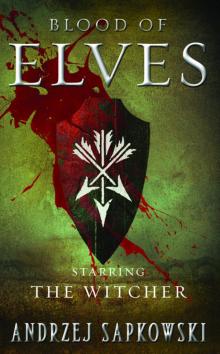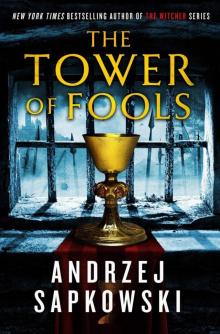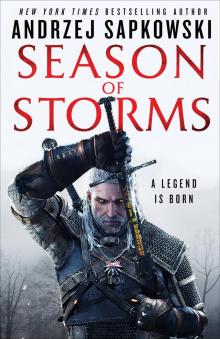- Home
- Andrzej Sapkowski
Season of Storms Page 10
Season of Storms Read online
Page 10
“Your Highness continues to err,” Geralt countered. “It isn’t proof. They are fabricated slanders, ineptly fabricated, to boot. I’ve never been employed in Tiberghien. I haven’t even heard of the settlement of Sotonin. Any bills from there are thus blatant counterfeits; it won’t be hard to prove it. And the ghouls I killed in Zgraggen were, indeed, devoured by, ha-ha, other ghouls, because such are the habits of ghouls. And the corpses buried in that cemetery from then on are decomposing peacefully, because the surviving ghouls have moved out. I don’t even want to comment on the rest of the nonsense contained in those documents.”
“A suit will be brought against you on the basis of those documents.” The prince placed a hand on them. “It will last a long time. Will the evidence turn out to be genuine? Who can say? What verdict will finally be reached? Who cares? It’s meaningless. The important thing is the stink that will spread around. And which will trail after you to the end of your days.
“Some people found you disgusting, but tolerated you out of necessity, as a lesser evil, as the killer of the monsters that threaten them,” he continued. “Some couldn’t bear you as a mutant, felt repulsion and abomination as though to an inhuman creature. Others were terribly afraid of you and hated themselves for their own fear. All that will sink into oblivion. The renown of an effective killer and the reputation of an evil sorcerer will evaporate like feathers in the wind, the disgust and fear will be forgotten. They will remember you only as an avaricious thief and charlatan. He who yesterday feared you and your spells, who looked away, who spat at the sight of you or reached for an amulet, will tomorrow guffaw and elbow his companion: ‘Look, here comes the Witcher Geralt, that lousy fraudster and swindler!’ If you don’t undertake the task I’m commissioning you with, I’ll destroy you, Witcher. I’ll ruin your reputation. Unless you serve me. Decide. Yes or no?”
“No.”
“Let it not seem to you that your connections—Ferrant de Lettenhove or your red-headed sorceress lover—will help you with anything. The instigator won’t risk his own career, and the Chapter will forbid the witch from getting involved in a criminal case. No one will help you when the judicial machine entangles you in its gears. I’ve commanded you to decide. Yes or no?”
“No. Definitively no, Your Highness. The man hidden in the bedchamber can come out now.”
The prince, to Geralt’s astonishment, snorted with laughter. And slapped a hand on the table. The door creaked and a figure emerged from the adjoining bedchamber. A familiar figure, in spite of the gloom.
“You’ve won the wager, Ferrant,” said the prince. “Report to my secretary tomorrow for your winnings.”
“Thank you, Your Princely Grace,” Ferrant de Lettenhove, the royal instigator, replied with a slight bow. “But I treated the wager purely in symbolic terms. To emphasise just how certain I was of being right. I was by no means concerned about the money—”
“The money you won,” the prince interrupted, “is also a symbol to me, just like the emblem of the Novigradian mint and the profile of the reigning monarch stamped on it. Know also, both of you, that I have also won. I have regained something I thought was irretrievably lost. Namely, faith in people. Geralt of Rivia, Ferrant was absolutely certain of your reaction. I, however, admit that I thought him naive. I was convinced you would yield.”
“Everybody’s won something,” Geralt stated sourly. “And I?”
“You too.” The prince became grave. “Tell him, Ferrant. Enlighten him as to what’s at stake here.”
“His Grace Prince Egmund, here present,” explained the instigator, “deigned for a moment to impersonate Xander, his younger brother. And also, symbolically, his other brothers, the pretenders to the throne. The prince suspected that Xander or another of his brothers would want to make use of this convenient witcher with the aim of seizing the throne. So we decided to stage this … spectacle. And now we know that if it were in fact to occur … Should someone indeed make a proposition, you wouldn’t be lured into princely favour. Or be daunted by threats or blackmail.”
“Quite.” The Witcher nodded. “And I acknowledge your talent. Your Majesty entered the role splendidly. I didn’t detect any artifice in what you deigned to say about me, in the opinion you had of me. On the contrary. I sensed pure frankness—”
“The masquerade had its objective.” Egmund interrupted the awkward silence. “I achieved it and don’t intend to account for myself before you. And you will benefit. Financially. For I indeed mean to engage you. And reward your services amply. Tell him, Ferrant.”
“Prince Egmund,” said the instigator, “fears an attempt on the life of his father, King Belohun, which may happen during the nuptials planned for the feast of Lughnasadh. The prince would feel better if at that time somebody … like a witcher … could be responsible for the king’s safety. Yes, yes, don’t interrupt, we know witchers aren’t bodyguards, that their raison d’être is to defend people from dangerous magical, supernatural and unnatural monsters—”
“That’s how it is in books,” the prince interrupted impatiently. “In life it’s not so simple. Witchers have been employed to defend caravans, trekking through wildernesses and backwoods teeming with monsters. It has happened, however, that instead of monsters, the merchants were attacked by ordinary robbers, and the witcher’s role was not at all to assault their persons, and yet he did. I have grounds to fear that during the nuptials the king may be attacked by … basilisks. Would you undertake to defend him from basilisks?”
“That depends.”
“On what?”
“On whether this is still a set-up. And whether I’m the object of another entrapment. From one of the other brothers, for instance. A talent for impersonation is not, I wager, a rarity in your family.”
Ferrant bristled with rage. Egmund banged a fist on the table.
“Watch your step,” he snapped. “And don’t forget yourself. I asked you if you would undertake it. Answer!”
“I might undertake the defence of the king from hypothetical basilisks.” Geralt nodded. “Unfortunately, my swords were stolen from me in Kerack. The royal services have still not managed to pick up the thief’s trail and are probably doing little in that regard. I’m unable to defend anyone without my swords. I must therefore decline for practical reasons.”
“If it is merely a matter of your swords, there’s no problem. We shall recover them. Shan’t we, Lord Instigator?”
“Absolutely.”
“You see. The royal instigator confirms absolutely. Well?”
“Let them first recover the swords. Absolutely.”
“You’re a stubborn character. But let it be. I stress that you will receive payment for your services and I assure you that you won’t find me parsimonious. Regarding other benefits, however, some of them you will gain at once, as an advance, as proof of my goodwill, if you like. You may consider your court case dismissed. The formalities must be carried out, and bureaucracy doesn’t recognise the concept of haste, but you may now consider yourself a person free of suspicion, with freedom of movement.”
“I am inordinately grateful. And the testimonies and invoices? The leucrote from Cizmar, the werewolf from Guaamez? What about the documents? The ones Your Royal Highness deigned to use as … theatrical properties?”
“The documents will remain with me.” Egmund looked him in the eye. “In a safe place. An absolutely safe place.”
King Belohun’s bell was just striking midnight when he returned.
Coral, it ought to be acknowledged, kept calm and reserved. She knew how to control herself. Even her voice didn’t change. Well, almost.
“Who did that to you?”
“A vigilosaur. A kind of lizard …”
“A lizard put in those stitches? You let a lizard stitch you up?”
“The stitches were put in by a physician. And the lizard—”
“To hell with the lizard! Mozaïk! A scalpel, scissors and tweezers. A needle and catgut. Elixir of woundw
ort. Decoction of aloes. Unguentum ortolani. A compress and sterile dressing. And prepare a mustard seed and honey poultice. Move, girl!”
Mozaïk made short work of it. Lytta set about the procedure. The Witcher sat and suffered in silence.
“Physicians who don’t know magic ought to be banned from practising,” drawled the sorceress, putting in the stitches. “Lecture at universities, why not? Sew up corpses after post-mortems, by all means. But they shouldn’t be allowed to touch living patients. But I probably won’t live to see it, everything’s going the opposite way.”
“Not only magic heals,” Geralt risked an opinion. “And physicians are necessary. There’s only a handful of specialised healing mages, and ordinary sorcerers don’t want to treat the sick. They either don’t have time or they don’t think it worth it.”
“They think right. The results of overpopulation may be disastrous. What’s that? That thing you’re fiddling with?”
“The vigilosaur was tagged with it. It had it permanently attached to its hide.”
“You tore it from it as a trophy deserving of the victor?”
“I tore it off to show you.”
Coral examined the brass oval plate the size of a child’s hand. And the signs embossed on it.
“A curious coincidence,” she said, applying the mustard poultice to his back, “bearing in mind the fact that you’re heading that way.”
“Am I? Oh, yes, true, I’d forgotten. Your confraters and their plans concerning me. Have the plans taken shape, perhaps?”
“That’s right. I’ve received news. You’ve been asked to go to Rissberg Castle.”
“Been asked? What an honour. To Rissberg. The seat of the renowned Ortolan. A request, I presume, I cannot decline.”
“I wouldn’t advise it. You’re asked to go forthwith. Bearing in mind your injuries, when will you be able to set off?”
“Bearing in mind my injuries, you tell me. Physician.”
“I shall tell you. Later … But now … You won’t be around for some time and I shall miss you … How do you feel now? Will you be able … That’ll be all, Mozaïk. Go to your room and don’t disturb us. What’s the meaning of that smirk? Am I to freeze it permanently to your mouth?”
INTERLUDE
Dandelion, Half a Century of Poetry
(a passage of a rough draft never officially published)
Verily, the Witcher was greatly in my debt. More and more every day.
The visit to Pyral Pratt in Ravelin, which ended, as you know, turbulently and bloodily, brought certain benefits, however. Geralt had picked up the sword thief’s trail. It was to my credit, in a way, for it was I, using my cunning, who led Geralt to Ravelin. And the following day it was I, and no other, who fitted Geralt out with a new weapon. I couldn’t bear to see him unarmed. You’ll say that a witcher is never unarmed? That he is a mutant well-versed in every form of combat, twice as strong as a normal fellow and ten times as fast? Who can fell three armed thugs with a cooper’s oaken stave in no time? That to cap it all he can work magic using his Signs, which are no mean weapon? True. But a sword is a sword. He repeated relentlessly that he felt naked without a sword. So, I fitted him out with one.
Pratt, as you now know, rewarded the Witcher and I financially, none too generously, but I mustn’t grumble. The next day, as Geralt had instructed me, I hurried with the cheque to the Giancardi branch and cashed it. I’m standing there, looking around. And I see that somebody is observing me intently. A lady, not too old, but also not in the first flush of youth, tastefully and elegantly attired. I am no stranger to a lady’s delighted look; plenty of women find my manly and wolfish features irresistible.
The lady suddenly walks over, introduces herself as Etna Asider and claims to know me. Huh, what a thing! Everybody knows me, my fame precedes me, wherever I go.
“News has reached me, m’lord poet,” she says, “about the unfortunate accident that befell your comrade, the Witcher, Geralt of Rivia. I know he has lost his weapons and is in urgent need of new ones. I am also aware that a good sword is hard to find. It so happens that I possess one. Left by my deceased husband, may the Gods have mercy upon his soul. At this very moment, I’ve come to the bank to sell the sword; for what could a widow want with a sword? The bank has valued it and wants to take it on a commission basis. While I, nonetheless, am in urgent need of ready coin, for I needs must pay the debts of the deceased, otherwise my creditors will torment me. Thus …”
Upon which the lady picks up a roll of damask and unwraps a sword from it. A marvel, let me tell you. Light as a feather. The scabbard tasteful and elegant, the hilt of lizard’s skin, the cross guard gilt, with a jasper the size of a pigeon’s egg in the pommel. I draw it and can’t believe my eyes. A punch in the shape of the sun on the blade, just above the cross guard. And just beyond it the inscription: Draw me not without reason; sheath me not without honour. Meaning the blade was wrought in the Nilfgaardian city of Viroleda, a place famous throughout the world for its armourers’ forges. I touch the blade with the tip of my thumb—razor-sharp, I swear.
Since I’m nobody’s fool, I betray nothing, I look on indifferently as the bank clerks bustle around and some poor old woman polishes the brass doorknobs.
“The Giancardis’ bank,” quoth the little widow, “valued the sword at two hundred crowns. For official sale. But for cash in hand I’ll part with it for a hundred and fifty.”
“Ho, ho,” I reply. “A hundred and fifty is a deal of money. You can buy a house for that. A small one. In the suburbs.”
“Oh, Lord Dandelion.” The woman wrings her hands, shedding a tear. “You’re mocking me. You are a cruel fellow, sir, to take advantage of a widow so. Since I am trapped, so be it: a hundred.”
And thus, my dears, I solved the Witcher’s problem.
I scurry off to The Crab and Garfish, Geralt is already sitting there over his bacon and scrambled eggs, ha, no doubt there was white cheese and chives for breakfast at the red-headed witch’s. I stride up and—clang!—I slam the sword down on the table. Dumbfounding him. He drops his spoon, draws the weapon from the scabbard and examines it. His countenance stony. But I am accustomed to his mutant state and know that emotions have no effect on him. No matter how delighted or happy he might be, he doesn’t betray it.
“How much did you give for it?”
I wished to answer that it wasn’t his business, but I recalled in time that I had paid with his money. So I confessed. He squeezed my arm, didn’t say a word, the expression on his face unchanged. That is him all over. Simple, but sincere.
And he told me he was setting off. Alone.
“I’d like you to stay in Kerack.” He anticipated my protests. “And keep your eyes and ears open.”
He told me what had happened the previous day, about his evening conversation with Prince Egmund. And fidgeted with the Viroledian sword the whole time, like a child with a new toy.
“I don’t mean to serve the duke,” he recapitulated. “Nor participate in the royal nuptials in August in the role of bodyguard. Egmund and your cousin are certain they will seize the sword thief forthwith. I don’t share their optimism. And that actually suits me. With my swords, Egmund would have an advantage over me. I prefer to catch the thief myself, in Novigrad in July, before the auction at the Borsodys’. I’d get my swords back and I wouldn’t show my face in Kerack again. And you, Dandelion, keep your mouth shut. No one can know what Pratt told us. No one. Including your cousin the instigator.”
I promised to be as silent as the grave. While he looked at me strangely. Quite as though he didn’t trust me.
“And because anything might happen,” he continued, “I must have an alternative plan. I’d like to know as much as possible about Egmund and his siblings, about all the possible pretenders to the throne, about the king himself, about the whole, dear royal family. I’d like to know what they’re planning and plotting. Who’s in with whom, what factions are active here and so on. Is that clear?”
&
nbsp; “You don’t want to involve Lytta Neyd in this, I gather,” I responded. “And rightly so, I think. The red-haired beauty certainly has perfect insight into the matters interesting you, but the local monarchy binds her too much for her to consider double loyalty, for one thing. And for another, don’t let on that you’ll soon flee and won’t be showing up again. Because her reaction may be violent. Sorceresses, as you’ve found out directly, don’t like it when people disappear.
“As regards the rest,” I promised, “you can count on me. I shall have my ears and eyes in readiness and directed at where they’re needed. And I’ve become acquainted with the dear, local royal family and heard enough gossip. Our Gracious King Belohun has produced numerous offspring. He has changed his wife quite often. Whenever he spots a new one, the old one conveniently bids farewell to this world, by an unfortunate twist of fate, suddenly falling into infirmity, in the face of which medicine turns out to be impotent. In this way, the king has four legal sons today, each one with a different mother. Not counting his innumerable daughters, as they can’t pretend to the throne. Or bastards. It’s worth mentioning, however, that all the significant positions and offices in Kerack are filled by his daughters’ husbands—my cousin Ferrant is an exception. And his illegitimate sons manage commerce and industry.”

 something ends something begins sapkowski
something ends something begins sapkowski The Last Wish
The Last Wish Baptism of Fire
Baptism of Fire Blood of Elves
Blood of Elves Lastavičja Kula
Lastavičja Kula Gospodarica Jezera
Gospodarica Jezera Vatreno Krštenje
Vatreno Krštenje Sezona Oluja
Sezona Oluja Lady of the Lake
Lady of the Lake The Road With No Return
The Road With No Return Time of Contempt
Time of Contempt Mač Sudbine
Mač Sudbine The Malady and Other Stories: An Andrzej Sapkowski Sampler
The Malady and Other Stories: An Andrzej Sapkowski Sampler The Saga of the Witcher
The Saga of the Witcher The Tower of Fools
The Tower of Fools Vreme Prezira
Vreme Prezira Introducing the Witcher
Introducing the Witcher Stephen Hulin
Stephen Hulin The Time of Contempt
The Time of Contempt The Sword of Destiny
The Sword of Destiny Season of Storms
Season of Storms The Tower of Swallows
The Tower of Swallows The Last Wish: Introducing The Witcher
The Last Wish: Introducing The Witcher The Lady of the Lake
The Lady of the Lake